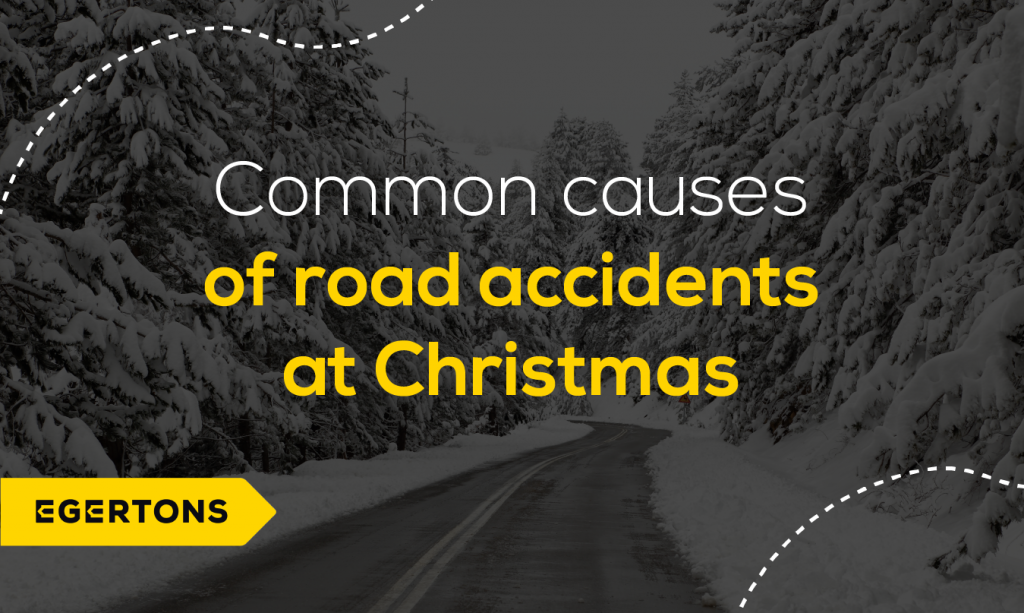No matter what, roads always demand a drivers’ full attention, and whilst it’s not always possible to avoid road accidents at Christmas time, taking unnecessary risks can have serious consequences.
According to AccuWeather, roughly 156,000 vehicle accidents take place during the Christmas season, with 76,000 people injured and 1,300 fatalities due to severe crashes.
What’s more, latest data from Admiral Car Insurance has revealed more severe road traffic accidents are happening in winter due to many motorists being unprepared for driving in winter weather and ignoring weather warnings.
The data shows that November, December and January are reported to have the highest volume of car insurance claims over the year, and that over the last five years, there has been an average 25% increase in the number of car insurance claims made in November compared with April– which sees the lowest number of accident claims on average.
But what are the most common causes of road accidents at Christmas time, and where possible, how can we stop them from happening?
Spin-out collisions due to severe weather
The colder winter weather bring can often bring heavy snowfall and ice, leading to slippery roads, reduced visibility and severe driving conditions, however according to Admiral’s data, 18% of drivers said they would risk driving despite a red weather warning being issued.
In terms of physical danger to life, weather warning are not to be ignored under any circumstances. A red weather warning means dangerous weather is expected, and when a red weather warning is announced it is best to avoid travelling all together.
For those who simply cannot afford to be off the road however, it’s always best to take turns slowly, and reduce speed by at least 10-20 mph, especially as when road surfaces are slick, it’s very easy to spin out and lose control of a vehicle – one of the most common and severe accidents that take place at Christmas time.
This is because, for example, if a driver were to lose control of their vehicle and spin out after ignoring a severe weather warning, they could be spun into the other lane of oncoming traffic. When a vehicle is spinning, it’s impossible to regain control until it hit something, or the vehicle comes to a stop.
The best thing to do when a vehicle is spinning is to try to steer in the direction of the skid, and not to try to fight the way it’s going as this will only exacerbate the problem. As scary as it might be, it’s important to stay calm because any certain movements will make things worse.
If the vehicle is skidding to the right, then turning the wheels to the right will help, and when the chance is there, turning on hazard lights to warn other drivers that the vehicle has lost control is essential.
Drink driving
Christmas is of course the party season, and results from the latest national policing operation to target drink and drug driving across the UK reveal 8,713 positive results from those tested for drink and drug driving during the six week period which ran from 21 November 2022 – 1 January 2023.
Each year, policing intensifies around drink and drug driving over the Christmas period, focussing on increased numbers of roadside breath tests and drugs wipes, education and engagement with drivers and a call to report anyone suspected of driving under the influence.
And yet, in 2022 the number of roadside drug wipes increased year over year to 6,273 in 2022 compared with 4,668 in 2021, with 54% of those drivers testing positive. 52,667 roadside breath tests were also undertaken with 10% of motorists testing positive, failing the test or refusing to undertake the test.
A total of 66,014 vehicles were stopped during this Christmas period, with Road Safety Charity Brake reporting that December was the second worst month for drink-driving crashes, with 4,150 reported with reasonings such as driving home from Christmas work parties, having ‘just a couple’ of drinks and admitting that they simply felt sober enough to drive.
Read end crashes on black ice
Back to Admiral’s data, 10% of motorists said they have been involved in a vehicle accident caused by black ice on the roads, as temperatures drop below zero in the winter months, with only 27% saying they felt confident in their actions should their car hit black ice, and 16% saying they wouldn’t know what to do if they found themselves in that situation.
A drivers’ first reaction when sliding on black ice will more than often be to hit the brakes, however this can actually make things worse as fast braking only helps when the road is clear ahead. Because of this, rear-end collisions are a common road accident at Christmas time as drivers misjudge the distance between them and the other vehicle, making it easier to crash into the vehicle ahead.
To prevent a rear-end crash, it’s best to allow at least two or three car lengths of distance between the vehicle in front. Increasing this range gives more room to manoeuvre should a vehicle start to slide or skid, and also gives more stopping distance so a harsh brake won’t be necessary.
Driving through flood water despite warnings
Looking at the data from Admiral, 50% of drivers on UK roads said they would physically ignore severe or normal flood warnings and continue to drive, even though a severe warning indicates a danger to life.
Driving through flood water can put drivers and other road users at risk, as the water damage is more likely to leads to a loss of control of the vehicle. On top of that, any damage caused to a vehicle from driving through flood water may not be covered by insurance, something which 68% of motorists weren’t aware of.
Skipping the de-icer
The data from Admiral shows a that a staggering 32% of motorists do not keep de-icer in their car during the winter months, and that 23% do not keep an ice scraper to hand either.
24% of drivers also confessed to driving without fully de-icing their windscreen first. Not only is it illegal to drive with any ice or snow on a windscreen as it obstructs the view and breaks the Highway Code Rule 229 which can lead to a fine, but drivers who set off with unclear windscreens contributed to 22 fatal or serious injury accidents last year, whilst at least 19 people died and 259 were seriously injured in accidents where road users couldn’t see properly in rain, sleet, snow and fog, according to the Department for Transport, Reported Road Casualties report.
Through snow, sleet or ice, we’ll be there when you need us.
Egertons is one of the UK’s leading vehicle rescue and recovery operators. We’re a dynamic organisation at the forefront of change within the recovery industry, and we’re proud of our 55-year vehicle recovery heritage.
But, what truly sets us apart is our 300-strong fleet, vast range of equipment and the technology it is equipped with. This is supported by our 24-hour control room, and having invested in industry leading software, we can seamlessly track the progress of all our vehicles and allocate jobs straight to the recovery technicians.
We’re here to make your job easier; whatever you need, whenever you need it.


